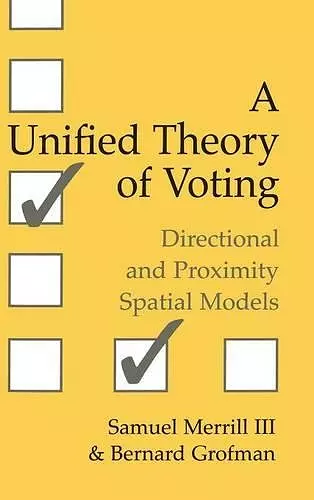A Unified Theory of Voting
Directional and Proximity Spatial Models
Samuel Merrill, III author Bernard Grofman author
Format:Hardback
Publisher:Cambridge University Press
Published:13th Sep '99
Currently unavailable, and unfortunately no date known when it will be back
This hardback is available in another edition too:
- Paperback£25.99(9780521665490)

The authors develop a unified model that incorporates voter motivations and assess its empirical predictions in the US, Norway, and France.
This book addresses the questions: how do voters use their own issue positions and those of candidates to decide how to vote? Does a voter tend to choose the candidate who most closely shares the views of the voter or rather a candidate who holds more extreme views due to the fact that the voters discount the candidates' abilities to implement policy. The authors develop a unified model that incorporates these and other voter motivations and assess its empirical predictions - for both voter choice and candidate strategy - in the US, Norway, and France. The analyses show that a combination of proximity, direction, discounting, and party ID are compatible with the mildly but not extremely divergent policies that are characteristic of many two-party and multiparty electorates. All of these motivations are necessary to understand the linkage between candidate issue positions and voter preferences.
'… the most significant contribution of this book is that it successfully derives explanations for macroscopic phenomenon, such as the nature of party system and government alternations, based on the proximity, directional and mixed models of micro-level voting behaviour.' Japanese Journal of Political Science
ISBN: 9780521662222
Dimensions: 229mm x 152mm x 17mm
Weight: 450g
230 pages